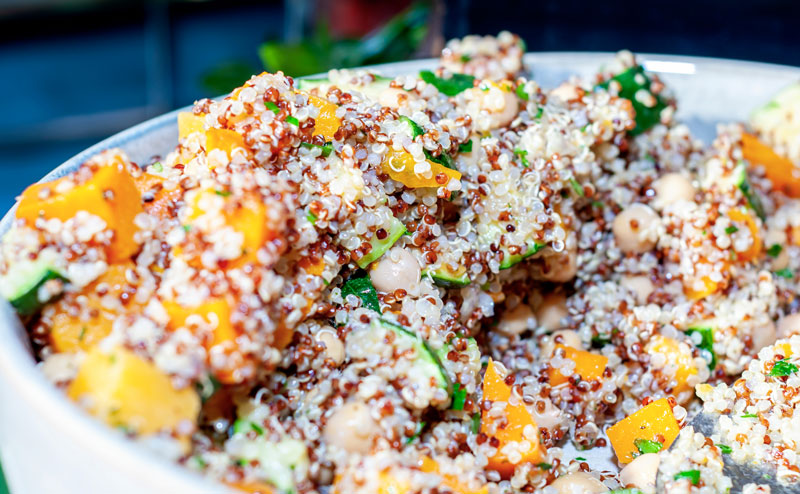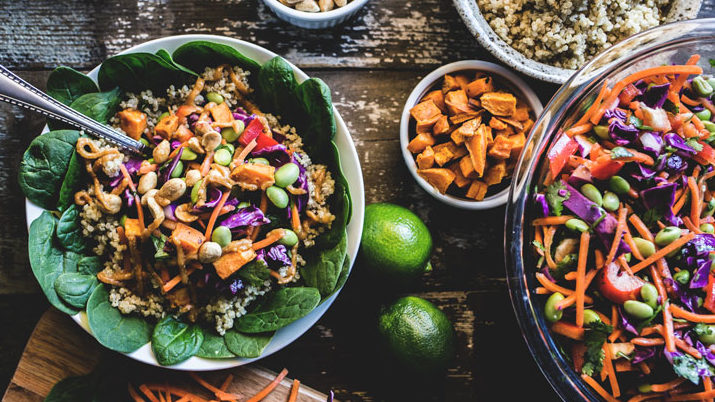As a new way to view our relationship with food, Clean Eating might well solve another big problem: our relationship with the bathroom scales! Here’s a taster menu for three clean, on-trend “diets”.
Apart from anything else, clean eating has the merit of putting a label on a new phenomenon. Clean eating is about putting diet front and centre in terms of our health and wellbeing. Simply put, it’s about avoiding processed foods from mass retail and getting back to a diet of healthy foods, without additives (colourants, artificial flavours and sweeteners) or pesticides, added salt or sugar. It’s about favouring Clean Food, i.e. whole foods that are fresh and in season. Only good honest food makes it onto your plate.
Less flour, less sugar, less salt and less added fat, that add empty calories which only make you gain weight without delivering any goodness.
More fibre and vegetables to keep hunger and the insulin spike under control, load up on vitamins and minerals, ease digestion, reduce appetite and, inevitably, bring about weight loss.

But Clean Eating is more than yet another fad diet. It’s a lifestyle, a true phenomenon in Western society, running counter to poor diet, which is behind a rise in obesity. It’s also a new way of approaching your body’s needs, with a view to preventing ailments, which inevitably has an impact on your weight. Eating a healthy balanced (preferably organic) diet, favouring good fats and good food combinations make it possible to prevent certain diseases, not least cardiovascular ones. Clean Eating is also about alleviating tiredness… And getting back to a weight at which you are in good health while going easy on your metabolism.
Within this new better eating movement, concepts like intermittent fasting, gluten free and vegan diets are coming through. As with Clean Eating, whatever you do, don’t go on these diets to lose weight… But weight loss might well ensue. Here we review these three major healthy eating trends.
Intermittent fasting
- The principle:
To switch between periods of food intake and no food intake, each lasting several hours. For example, a 12-hour intermittent fasting plan may consist of skipping dinner or breakfast. Intermittent fasting is easier to fit into daily life than continuous fasting for a day or more.
- The secondary benefits:
Giving your digestive system a rest offers more than one advantage. Not least that of promoting offloading and detoxing in the body, reducing insulin secretion and reducing the redepositing of fats and sugars.
- The precautions to take:
It’s worth enlisting professional supervision for fasting (intermittent or continuous), to avoid any mishaps or side effects (tiredness, compulsive eating, etc…)
- The idea to pinch:
Fasting on Sunday evenings, if you’ve eaten a lot over the weekend for example.
“Gluten free” foods

- The principle:
From intolerance (coeliac disease, an autoimmune disease) to (non-coeliac) hypersensitivity, there’s an awful lot of talk about gluten! And not really in a good way (stomach ache, bloating, diarrhoea, chronic tiredness)! And the worst thing is that gluten, a protein found in a great many cereal types, turns up in almost all food products. This is because it’s used in the agri-food industry to help food items keep their shape. So those wanting to hunt it down and cut it out of their diet are highly tempted to go all Sherlock Holmes, checking ingredients labels for traces of gluten.
- The secondary benefits:
Cutting out gluten makes it possible to get acquainted with other long-forgotten cereal types (buckwheat, spelt, etc.). Moreover, gluten is found in processed foods that weigh heavy on the bathroom scales (since they are high in fat and sugar) like pizza, quiche and hamburgers. So going on a gluten-free diet helps to rein in temptation and weight gain.
- The precautions to take:
Cutting out gluten completely must only be done following a medical diagnosis (based on an examination such as a biopsy etc.).
- The idea to pinch:
Cutting out bread, cakes and potatoes for several weeks, if you want to see inch loss.
The vegan diet

- The principle:
To cut out all foods that come from animals (meat, fish, shellfish, etc.) and also those produced via animal exploitation (honey, eggs, dairy products, etc.). Those who follow this diet do so mainly for ethical, animal welfare and environmental reasons.
- The secondary benefits:
Cooking without butter and without animal fat makes it possible to lower the risk of becoming overweight, prevent cardiovascular diseases and keep cholesterol levels under control. Vegetables, fruit and plant-based alternatives are there for the taking!
- The precautions to take:
Look out for signs of the various deficiencies associated with this diet, not least that of vitamin B12 (which is only found in foods that come from animals).
- The idea to pinch:
For meat eaters, eating less meat and having one or two totally vegan meals per week to make for a more varied diet.
Four pieces of advice for eating even better and slimming down
1- Eat mindfully:
It’s the first mouthfuls that are the most pleasurable. Take the time to savour them and unpack the texture and taste of foods.
2- Listen to your needs:
Do you feel hungry? If so, how does your hunger present? Very often, we eat without being hungry (and therefore eat too much). Learning to pick up your body’s signals (hunger, and also satiety) allows you to eat only as much as you need, without thinking about it!
3- Treat yourself:
Depriving yourself (of chocolate, cheese, etc.) will not be sustainable in the longer term. Demonisation of certain foods brings frustration and a tendency to cave (along with a risk of bingeing). It’s preferable to learn to eat less, but better. For example, perhaps you’re keen on cheese? Don’t deprive yourself of it, but have it in the morning with breakfast or to round off your lunch, rather than in the evening before going to bed! The same goes for chocolate: it’s better to eat it at 4 in the afternoon, than while watching the 9 o’clock movie!
4- Understand that you are unique:
There’s no miracle diet (if there was, it would be common knowledge!). To lose weight, what works is patience and long-term rebalancing. However, what works for your neighbour may not suit your body type or lifestyle (for example, she may be the sporty type whereas you are not).
One thing to remember: get to really know yourself and you’ll easily find out what works for you!







